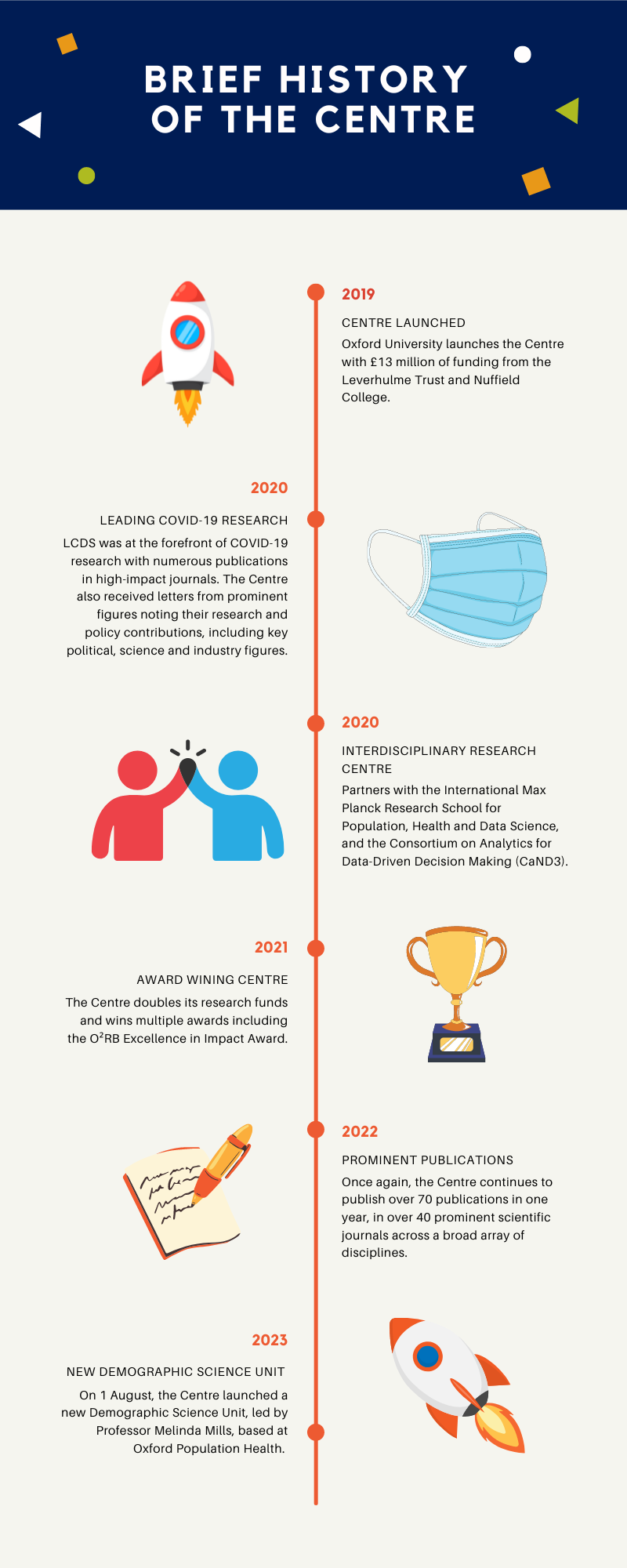The Leverhulme Centre for Demographic Science (LCDS) was launched in 2019 at the University of Oxford with £14.3 million in initial funding for 10 years from the Leverhulme Trust and Nuffield College. To date, the Centre has over 60 core staff members and students, published over 350 papers, and attracted over £11 million in additional research funding from sources such as the European Research Council, Economic and Social Research Council (ESRC), UK Research and Innovation (UKRI), National Institute of Health (NIH), British Academy, the Health Foundation and more.
Directed by Professor Melinda Mills, the Centre's aim is to disrupt, realign and infuse science into demography to tackle the most challenging problems of our time. The Centre is unapologetically interdisciplinary, infusing knowledge and high-dimensional data from demography, economics, geography, genetics, statistics, marketing and business, philosophy, history, sociology, zoology and beyond.
Our researchers and partners use new types of data, methods and unconventional approaches to address the most important issues of our time such as pandemics, climate change, war, inequality, and changes in life expectancy, mortality, fertility and migration.
The Centre’s research is published in high-impact journals with far reaching impacts on society and policy. The Centre's team of researchers received the O2RB Excellence in Impact Awards 2021, for their data-driven policy interventions during the COVID-19 pandemic. This included work on recognizing the importance of the demographic composition of populations in relation to disease, a social network meets epidemiology approach to social bubbles, quantifying life expectancy losses and changes, quantifying learning loss due to school closures, and evaluating the impact of COVID-19 certificates. Working closely with Royal Society, Mills and team also produced many timely reports on face coverings, instrumental in shaping UK government policy and on vaccine deployment and vaccine passports.
The Demographic Science Unit (DSU) was launched on 1 August 2023 and is at the forefront of demographic research in Oxford and beyond. Based at Oxford Population Health and directed by Professor Melinda Mills, the unit is home to the Leverhulme Centre for Demographic Science and world-leading demographers. From biosocial, computational and geospatial demography, to inequality, climate and family, the unit leverages existing and new types of data, alongside innovative methods and unconventional approaches to tackle the most challenging demographic and population problems of our time. The unit’s interdisciplinary and demographic expertise are disrupting and realigning the study of demography for the benefit of populations around the world.
The Centre works across multiple research areas to disrupt and realign demography.

 2019
2019
- Leverhulme Trust awards a Large Centre Grant with support from Nuffield College to launch the LCDS with £13 million of funding for an period of 10 years at the University of Oxford
- LCDS becomes an interdisciplinary demographic science research Centre, teaming up with leading institutions across Oxford and Cambridge University.
2020
- LCDS at the forefront of COVID-19 research with around 20 COVID-19 related publications in high-impact journals. The Centre received considerable media attention and letters from prominent figures noting their research and policy contributions.
- Director Melinda Mills invited as member of multiple COVID advisory boards for the UK Government (SAGE), No 10, European Commission, and Royal Society and awarded the PAA Clifford C. Clogg Award for mid-career achievement
- LCDS launches the GWAS Diversity Monitor
2021
- LCDS team wins an Impact Prize for data-driven policy interventions during COVID-19
- LCDS participates in three international PhD programmes at IMPRS-PHDS (Population, Health & Data Science), CaND3: Consortium on Analytics for Data-Driven Decision Making, and the Leverhulme Trust Biopsychosocial Doctoral Training Programme
- Director Melinda Mills is appointed as special advisor to the European Commission
2022
- LCDS continued to prioritize scientific excellence and interdisciplinary research, once again producing more than 70 publications in over 40 prominent scientific journals across a broad array of disciplines
- In the first two years, LCDS attracts an additional £9 million in funds from the European Research Council, UKRI, British Academy and others
- LCDS members receive multiple international awards including:
- Deputy Director Jennifer Beam Dowd PAA Clifford C. Clogg Award for Mid-Career Achievement
- Director Melinda Mills European Association of Population’s Trailblazer Award
- Per Engzell, Arun Frey and Mark Verhagen Cozzarelli Prize (YouTube video here)
- José Manuel Aburto Silver Medal from the Royal Danish Academy of Science and Letters
2023
- LCDS launches the new Demographic Science Unit, based at Oxford Population Health and directed by Professor Melinda Mills, to ensure longer term sustainability, and enhance our ability to engage in interdisciplinary research with the greatest global impact.
- LCDS is part of a new Oxford-Berlin alliance to develop the Einstein Center for Population Diversity. Funded by the Einstein Foundation, the centre will launch in early 2024 and become a leading institution in biosocial research.




